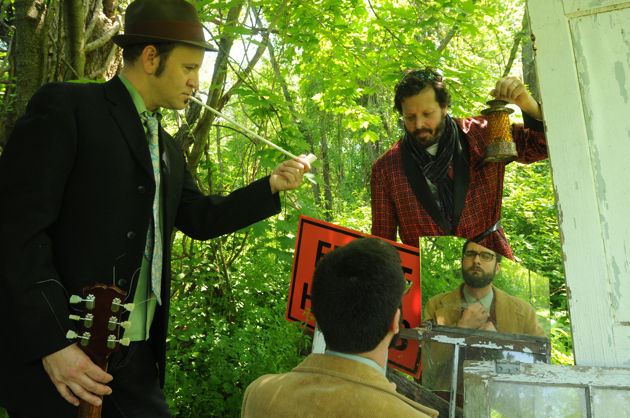Embracing information overload with Daniel Hales
- Ken Maiuri
- Jul 12, 2012
- 3 min read
Updated: Jan 31, 2023

“There’s just too much going on inside my head,” goes the chorus of a song on the new album by Daniel Hales and the Frost Heaves. It’s a sentiment that’s echoed and mirrored in other lyrics on the record. Is it information overload? Anxiety that won’t go away? Attention deficit?
The band’s gently psychedelic new album, “You Make a Better Door Than a Window,” is lovingly constructed to make a lot go on inside listeners’ heads. The record contains adventurously layered songs and a reprise near the end (a la the Beatles’ Sgt. Pepper album), all housed under an eye-tricking collage that includes hand-cut windows with a full lyric booklet peeking out underneath.
“We laid out, folded, cut and stapled all of those ourselves,” Hales said proudly.
Hales and his hardworking group will celebrate the release of “You Make a Better Door Than a Window” with two diverse and totally different shows on Sunday.
First, the electric band will perform on the Meltdown Stage at the Green River Festival in Greenfield at 5 p.m.
Then later that night Hales and the Frost Heaves will play a short acoustic set at the Rendezvous in Turners Falls at 7 p.m.
The acoustic set is part of a larger multimedia event that includes the screening of a short film about the making of the album, a showing of artwork from and inspired by the record, plus the release of a limited-edition chapbook, “I Have a Song To Tell You Now,” which collects 11 poems by 10 poets about each of the album’s songs, with readings by the authors.
Just like the music on the record, there’s a lot to take in.
“I like variety,” Hales said. “I enjoy all of these forms of expression — music, writing, visual art, video — and love the excuse to create an occasion that makes space for all of them.
“Just like I can get bored by going to a rock show where there are three bands on the bill playing the same genre, I like cultural events where there’s more than one thing happening. A ‘happening,’ as they called it in the ’60s. It’s more inclusive. It pulls in more people and gives them a chance to participate.”
Hales is part of a monthly writing group made up of former students in a master’s degree program in poetry at the University of Massachusetts Amherst. He got them involved in the happening, too.
“We came up with the idea of writing a poem about every song on the album as an assignment: write something ‘about/for/against/or in reaction to’ the song they were assigned,” he said. “Part of my thinking was that many people don’t pay much attention to [song lyrics]. Hopefully the chapbook would encourage listeners to spend time thinking about the words to the songs — and the different ways they could be interpreted.”
“Each shoulder shrug, each head that nods / each headstone placed above the sod / is a kind of braille for God,” ends one of the album’s prettiest songs, with its mini-orchestra of djembe, violin, horns and chimes. You hardly notice the atmospheric song doesn’t have a chorus.
“I was trying to push myself as a songwriter and arranger to break out of familiar patterns … keep it fresh, not just default to safe, familiar structures,” Hales said. “I also had bandmates for this one that really thrive on that kind of variety.
“Psychedelic-era Beatles and The New Pornographers [the wunderkind Canadian power-pop supergroup] had something to do with it, too,” he added. “Wanting to surprise the listener with unexpected but satisfying twists and turns.”
Creatively driven engineer Norm Demoura was back behind the board for the new Frost Heaves album.
I love working with him,” Hales said. “He has amazing ears and is so great at intuiting what a song needs. He was very receptive to my impulse to turn up the psychedelia. I believe Norm said ‘Present Perfect Tents’ was the hardest song he’s ever worked on.”
That droning, sitar-laced tune, which acts as the album’s “Tomorrow Never Knows,” was built from a rhythm created with the now-ancient Atari 2600 home video game system.
“Norm recorded me stomping on the wooden floors of his studio to create the ‘kick drum’ beat,” Hales said. “Then I added a few tabla tracks and we kept adding clap tracks until we could hear George Harrison clapping along. It was a lot of work, but so much fun.
“That’s my advice for anyone wanting to make great psychedelic music … clap ’til you hear George Harrison clapping along, and you’ve arrived.”
This post originally appeared in the Daily Hampshire Gazette's "Clubland" column.


Comments